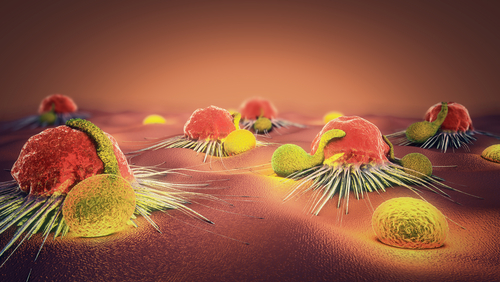Researchers at Uppsala University, in Sweden, in collaboration with the SciLifeLab Drug Discovery and Development Platform, have taken “a large step forward” in developing a potential CAR T-cell therapy for glioblastoma, an aggressive form of brain cancer that is often difficult to treat.
Their project is now entering the final preclinical stage of development, according to the university. The goal is to start clinical studies within four years.
“Extremely few breakthroughs have been made around treating Glioblastoma,” Magnus Essand, professor of gene therapy at Uppsala, said in a press release.
“The tumours give rise to severe symptoms and the average survival expectancy after a diagnosis is only slightly above one year,” Essand said. “Creating a cure is still far off, but I hope that within the foreseeable future we can offer a therapy that lengthens as well as improves the quality of life for Glioblastoma patients.”
CAR T-cell therapy is a type of immunotherapy that involves collecting a patient’s own immune T-cells — a type of white blood cell that is an essential part of the immune system — and genetically modifying them. The aim is to produce a man-made receptor called a chimeric antigen receptor, or CAR, that recognizes and targets a specific cancer protein.
After the genetic engineering step, the altered T-cells are expanded to millions and then infused back into the patient, where they are expected to eliminate cancer cells.
“The CAR will in this case be trained to selectively recognize glioblastoma cells,” Essand said.
Essand’s team has been working for several years to develop a CAR T-cell product for this aggressive brain cancer. The researchers are now entering the final preclinical stage of development.
The project, called “CAR T-cells for the treatment of Glioblastoma,” is being developed as part of a collaboration with the SciLifeLab’s drug discovery and development platform, known as DDD. SciLifeLab is a national resource in the country that supports Swedish researchers in developing new compounds, with the goal of creating future medicines.
Over the last 2.5 years, the project has been a priority at the DDD. The scientists have developed a series of antibodies against a glioblastoma target, aiming to use the best one as part of their CAR. Joint efforts have resulted in a recent patent application for a potential antibody to be used in their CAR T-cell therapy.
“The research group presented a high-quality project organisation, one that our platform has chosen to prioritize through to the end,” said Vendela Parrow, project leader at DDD.
“To use our expertise in the field of antibodies and apply it to CAR T-cells was a new experience for us, one which has given us important knowledge in advanced cell therapy,” Parrow said.
Data and reports recently were handed over from the DDD platform at the Uppsala Biomedical Centre. Both parties also stressed the synergy and productivity of the collaboration.
“To have access to the expertise and techniques provided by the DDD was critical for us in order to be able to advance our research,” said Tina Sarén, graduate student at Uppsala. “The fact that their team has been exceptionally clear in their communication around their progress within the project has made this a very educational time for me.”
In the next phase, the team will validate the results before producing vectors for delivering the selected CAR to T-cells.
“Development of a CAR T-cell product is a demanding process, one we embarked on several years ago,” Essand said. “The results are still looking promising as we now enter the last pre-clinical phase.”


